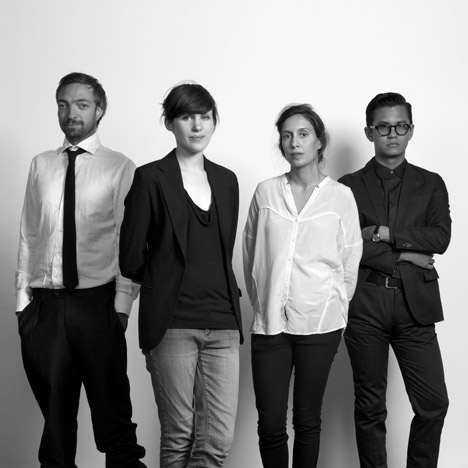News: architects, curators and students can now apply to participate in the Lisbon Architecture Triennale, which takes place from 12 September to 15 December 2013.
Under the theme “Close, Closer”, the triennale is curated by Beatrice Galilee (above, second from left), with (from left to right) Liam Young, Mariana Pestana and José Esparza, and aims to to examine the critical themes of architectural practice.
A series of grants will be awarded to applicants who propose "crisis-busting" and "civic-minded" projects for the city of Lisbon, plus one young architect or practice will be selected for a special recognition award.
University students are invited to compete to design an intervention at the Sinel de Cordes Palace in Campo de Santa Clara, which could be an installation, a text, a documentary or an audio broadcast.
There are also opportunities to join a programme of independently funded projects and the team invite proposals for exhibitions, talks and one-off events that directly tie in with the theme.
The deadlines for entries are listed below:
The Crisis Buster Grant Programme: 11 Feb 2013
Universities Award Competition: 18 February 2013
Associated Projects: 6 May 2013
Lisbon Architecture Triennale Début Award: 21 June 2012
Find out more on the event website.
Photography is by Lynton Pepper.
Here's an overview of the programme from the organisers:
Close, Closer, the third Lisbon Architecture Triennale, is initiating a discussion on the changing role of architects in contemporary society. We are addressing architecture in its broadest sense: as an agency for the transformation and design of space. Architecture as a living, social, cultural and artistic force that manifests itself in a plurality of outputs that go far beyond traditional construction.
From 12 September to 15 December 2013, Close, Closer will present four curatorial projects – Future Perfect, The Real and Other Fictions, New Publics and Institute Effect – which each examine distinct realms of spatial practice. A wider programme of debates, interventions, competitions, awards, performances and events will explore architecture part of a wider field of spatial practice, one that is closer to the city, its citizens and the future of the profession.
The exhibition Future Perfect, curated by Liam young, bring together an ensembles of scientists, technologists and visionaries to build tomorrow’s city. The cities we idealize for the future, onto which we project our aspirations and fears, are gradually being taken over by digital networks, emerging, nomadic, shifting and often intangible technologies. What part will architects play in designing these increasingly immaterial realities?
Held in the Carvalhos Palace, The Real and Other Fictions curated by Mariana Pestana, works as a group of fully functioning, interdisciplinary interventions on the scale of 1:1. The exhibition explores the uncanny space between reality and fiction: it is an artifice composed of real spaces and programmes. It re-enacts the different uses the building has housed throughout its history - hosting dinners, applying for visas, and sleeping over will all be possible, creating a synchronic experience from a contemporary perspective. Architecture is the stage for our interaction. To what extent is it also the script?
New Publics, curated by José Esparza, presents a 3-month-long programme of debates, interventions and performances held in a Lisbon square and open to widespread participation. The goal is to create a platform for exploring issues of civic import, a political stage to materialize arguments, controversies, proposals and strategies with a view to creating a collective social reality.
Institute Effect is an event of host and parasite. Acknowledging the influential role of magazines, galleries, libraries and museums in outlining, commissioning and articulating contemporary architectural discourse, Institute Effect invites 10 of these institutions to exhibit themselves in Lisbon through a rotating curatorship held at MUDE, Lisbon’s Museum of Fashion and Design.
In tandem with an innovative curatorial approach to exhibitions, the Triennale proposes several initiatives and pathways to participation that manifest its commitment to invest positively in the city of Lisbon. A grant programme for civic projects will be launched, together with a student competition, an award for young architects and an open call for Associated Projects.
Through Close, Closer the audience is invited to discuss and debate the role of architecture by exhibitions which revisit the future, re-imagine the past and reframe the present.

